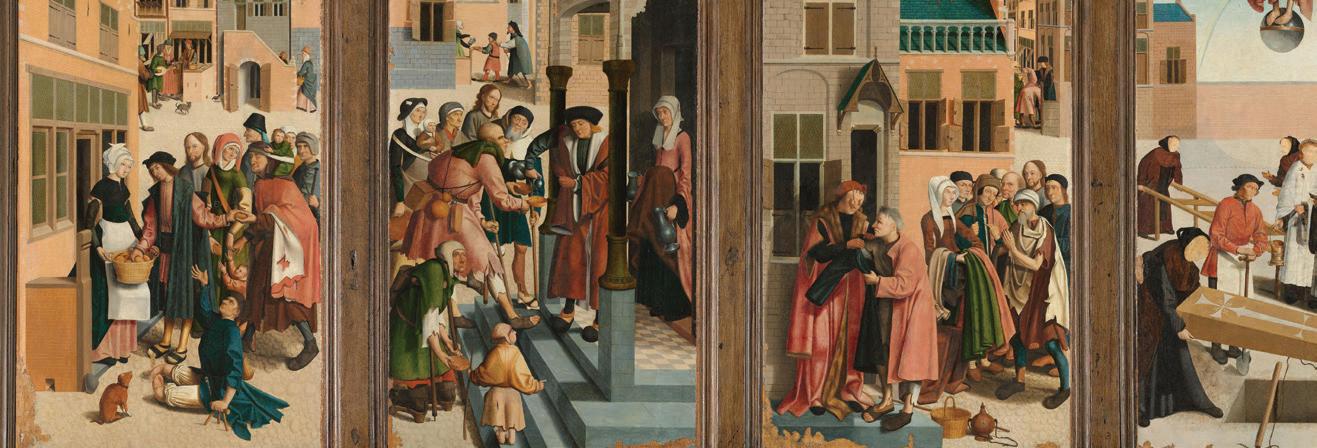
5 minute read
Light in the Mitre's Shadow
by Bryan Bohl
Many scholars and historians have credited Martin Luther as “the father of the Reformation.” Indeed, his work was pivotal to the movement’s growth and is still relevant today, even beyond Lutheran circles. However, it may be irresponsible to forget that Luther was not the sole source of the concerns and protests regarding the Roman Catholic Church, its teachings, leadership, and the need for reform. From the door of Castle Church in Wittenberg, God used Luther’s 95 Theses to ignite the Reformation from protests that had been circulating over the last several centuries. In his theses, Luther directly relayed some of the questions that had been expressed by shrewdminded laypeople who were recognizing inconsistencies between the doctrines and traditions within the Church and Scripture. Before Luther’s 95 Theses in 1517, many proto-protestants had challenged some of the practices of the established church, claiming that it was out of alignment with God’s Word, often precipitating a backlash of persecution from the papal authorities.
In the late 12th century, a wealthy French merchant named Peter Waldo experienced the very sudden death of a friend. The abrupt loss acutely altered his perspective regarding life’s brevity and fragility, which compelled him to ponder his own eternal destination. In his soul-searching, he sought wisdom from Scripture and the promise of the gospel, but he did not want it mediated by a priest of the Roman Catholic Church, whose doctrines he was already beginning to question. He commissioned a translation of the New Testament into common French, and in studying this translation, his concern and conviction deepened.
Waldo believed that people needed to study Scripture for themselves. He saw that the clergy were using the people’s ignorance of Scripture to perpetuate false doctrines that manipulated them for personal and political gain. Waldo began protesting this corruption within the Church while preaching and distributing copied portions of the French New Testament among the common people.
During this time, Waldo chose to adopt a lifestyle of poverty while giving to the needy and proclaiming the gospel of Christ. Some followed this example, and they began to be known as “Waldenses.” These bold believers spoke out against the Roman Catholic Church on many controversial issues, such as transubstantiation, indulgences, and prayers for the dead, garnering the attention of the Church’s leadership, pope included. The Waldenses fled, taking refuge from persecution in the high alpine valleys of southern France and northern Italy. From there, they continued to minister as traveling traders and peddlers, distributing carefully concealed portions of Scripture to anyone with a heart hungry for salvation in Christ.
Though Waldo’s movement was forced into hiding, its influence quietly endured. A century and a half later, amid great turmoil in the world, John Wycliffe, a young Catholic professor and theologian at the University of Oxford, began his own public challenge of the corruption within the Church and the papacy. Some of his more poignant and timely writings had a very polarizing effect on people, both spiritually and politically. He directly opposed the political authority that the pope held at the time and bluntly attacked his misuse of spiritual authority, saying that “Christ, not the Pope, is the true head of the Church.” He firmly believed that no authority on earth, Church included, could stand above the authority of Scripture.
Wycliffe also shared Waldo’s conviction that common people ought to have access to Scripture in a language they understand. To that end, in the latter part of his life, Wycliffe orchestrated the first full translation of the Latin Vulgate into English without authorization from the Church. Wycliffe himself was protected for a time by his position and standing at Oxford and by other powerful sympathizers, but his writings were condemned, and after his death, the Church labeled him a heretic. His followers, known as the “Lollards,” faced brutal persecution. Many were imprisoned, tortured, or burned at the stake for even possessing translated Scriptures or preaching without Church approval.
Throughout the centuries leading up to Martin Luther and the Protestant Reformation, Waldo and the Waldenses, Wycliffe and the Lollards, and other notable figures alongside countless more unnamed, contributed in their respective seasons with the means at their disposal—all of it according to the plan of a completely sovereign God. These people, their determination to seek the truth in Scripture, their faith to stand firm on the authority of God’s Word, and their courage to lay down their very lives in obedience to Christ, challenge us today. “Be sober-minded; be watchful. Your adversary the devil prowls around like a roaring lion, seeking someone to devour” (I Peter 5:8). Their faithfulness made it possible for many to receive and understand the gospel. Their bold protest of the pervasive corruption within the Church calls our generation of Protestants to hold high the light. “In the same way, let your light shine before others, that they may see your good deeds and glorify your Father in heaven” (Matthew 5:16).
Bohl is a member of Living Hope, Rogers, Minn. Artwork: “The Seven Works of Mercy,” (below) by Master of Alkmaar, 1504, Rijksmuseum. “Johannes Wiclif” (left), by Alexander van Haecken, c. 1735–57, The Trustees of the British Museum. “Peter Waldo” (right), 1877, anonymous, Wiki Commons.










